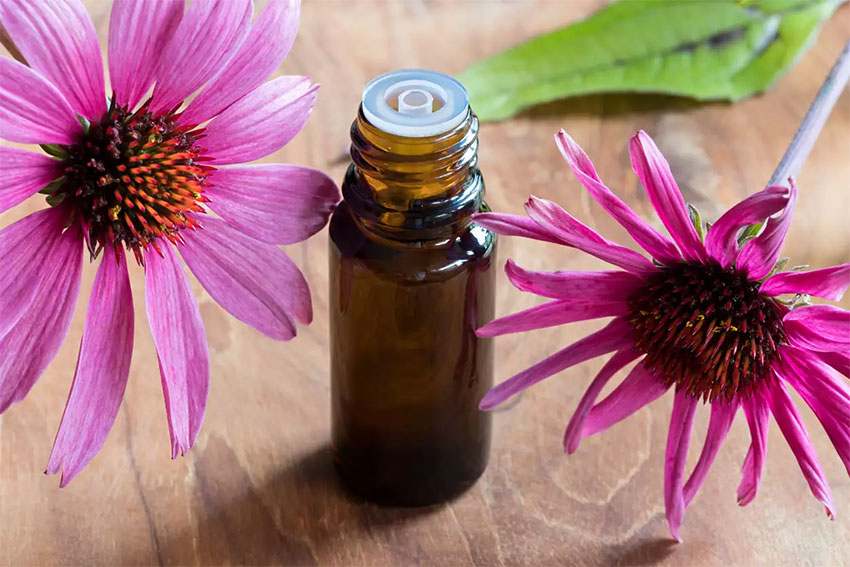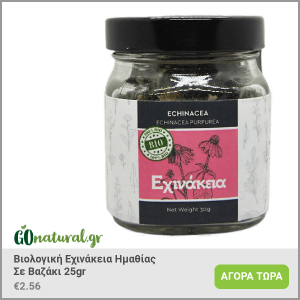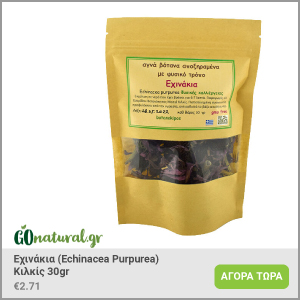Echinacea: Learn How It Can Benefit Your Health and Use It!
| On Dec03,2021
One has dealt with natural ways of fighting viruses, surely you have heard of echinacea – a powerful plant that dominates the market of natural remedies. This beautiful flower is constantly gaining ground as a miraculous solution in the treatment of various health conditions – from the fight against cancer to the relief of pain.
And the good news is that we can easily grow this flower and have it ready as soon as we need it!
What is echinacea!
Echinacea is a native asteroid flower with North American roots and has been used as a traditional natural medicine for more than 400 years by the Great Plains Indians. It is considered an herb, but many species of the plant are used to make medicines from flowers, leaves and roots.
Before 1950 and the introduction of antibiotics, echinacea held a prominent place in the pharmaceutical industry, however after the advent of antibiotics it ceased to be so popular.
Favorite flower of the gardener !
Echinacea purpurea, a coniferous flower with lilac flowers is the cult of gardeners and the butterfly – its flower is beautiful, noble and attractive, looks like a daisy with a head and rose petals, has pink or purple petals and grows with very strong stems foliage.
The root chemicals are significantly different from those of the top. The roots are rich in volatile oil concentrations, while the parts that grow above the ground contain more polysaccharides that are known to stimulate immune function. Echinacea extract is essentially a tincture from the top of the plant and is considered more effective.
Many of the chemical components of echinacea have significant therapeutic value – such as essential oils, flavonoids, inulin, polysaccharides and vitamin C.
It should be noted that in Germany the upper part of the plant is prescribed as a natural remedy for urinary tract, upper respiratory tract infections, viruses and slow wound healing.
Echinacea: How It Can Benefit Your Health!
Although the benefits are innumerable, there are 8 benefits that really stand out.
1. Strengthens the immune system
According to research in the journal Lancet Infectious Diseases on assessing the effects of echinacea, the following have been identified:
- Echinacea can reduce the chances of viruses by 58%.
- Echinacea reduces the duration of the common cold by about one and a half days.
Craig Coleman, Assistant Professor of Pharmaceutical Practice and lead author of the study, added: “The message from the study is that echinacea actually has strong benefits in preventing and treating viruses.” According to studies, the immune system seems to be strongly influenced by the level of dosage, where 10 milligrams of echinacea per kilogram of body weight, taken daily for a period of 10 days, are effective in improving the immune system. To date, research has shown that the plant may reduce the symptoms of the virus, but the effects of echinacea appear to be stronger with the onset of symptoms.
Finally, according to clinical trials , plant extracts fight viral respiratory infections, including the flu, while reducing inflammation and the risk of developing bacterial complications.
2. Analgesic
The Indians used echinacea as a painkiller. Echinacea is particularly effective for the following pains:
- Intestinal pain
- Headache
- HSV-related pain (herpes)
- Pain associated with gonorrhea
- Pain associated with measles
- Reptile bites
- Sore throat
- Stomach ache
- Tonsillitis
- Toothache
A common way to use echinacea to fight pain is to drink echinacea, or make a paste of dried echinacea and apply it topically to the affected area.
3. Fights constipation.
Like many herbs, echinacea has a healing effect on the stomach and gastrointestinal tract. According to Medical Herbalism, for example, echinacea has been shown to work as a mild laxative that relieves constipation and acts as a sedative.
Consumption of herbal tea is particularly effective for the symptoms of constipation. For chronic constipation, a cup of tea every day can relax the intestines – while 2-3 cups a day can help in acute cases of constipation.
However, to reduce the risk of side effects, avoid overconsumption. To be on the safe side, be sure to limit your tea to two cups a day, maximum, and take supplements as directed.
4. Anti-inflammatory agent.
Undoubtedly, inflammations cause diseases and endanger our health. Various factors – such as stress, food toxins and poor sleep – contribute to this! Fortunately, studies show that regular consumption of echinacea can alleviate various types of inflammation.
Products containing echinacea may fight ocular inflammation. People suffering from chronic inflammatory conditions, such as rheumatoid arthritis, it is advisable to regularly consume echinacea drink to fight inflammation.
5. Improves skin disorders.
Echinacea is also very good for the skin, improves hydration and reduces wrinkles, while fighting any irritation.
6. Improves our mental health.
Echinacea angustifolia is recommended for the treatment of diseases related to ADHD. and similar disorders. Both adults and children with these conditions are more likely to develop emotional disorders, such as:
- Anxiety
- Depression
- Social phobias
However, once again dosing is key. It is recommended to take only 20 milligrams per dose and no more. In fact, taking more than 20 milligrams per dose can actually nullify the benefits of echinacea.
7. Relieves respiratory problems.
Due to its adjuvant and anti-inflammatory effects, echinacea improves symptoms of upper respiratory disorders:
- Acute sinusitis
- Any form of flu
- Asthma
- Common cold / virus
- Diphtheria
- Inflammation
- Streptococcus
- Tuberculosis
- Whooping cough
According to clinical trials in asthmatics, echinacea acted similarly to conventional medicines. The researchers said that “Recent studies have shown that the secretion of asthma-related cytokines in bronchial epithelial cells can be reversed by echinacea preparations.”
In particular, echinacea showed significant bronchodilator and anti-inflammatory effects. The authors of the study concluded that “it provides a scientific basis for the application of this herb in traditional medicine as a complementary treatment for allergic airway disorders, such as asthma.”
For more serious conditions, it is better to use supplements that are more fortified than simple drinks.
8. Fights infections.
Echinacea is considered an excellent treatment for many infections. Studies show that taking echinacea and topical application of ointment can reduce the rate of recurrent vaginal infections by 16%. It is also known to help in situations such as:
- Blood infections
- Genital herpes
- Gum disease
- Malaria
- Syphilis
- Urinary tract infections
- Vaginal infections
Uses of echinacea.
- Avoiding viruses.
Studies show that using echinacea – 2,400 milligrams of extract / day – for four months can help prevent and prevent infections – or reduce the severity and duration of viral symptoms.
- Relief from the symptoms of the virus.
According to studies , the use of echinacea, with the appearance of the first symptoms, reduced the duration and severity of the common cold.
- Influenza prevention.
According to a cell study , various types of influenza viruses, including lethal avian influenza and swine flu, did not infect cultured human cells exposed to echinacea extract.
- Fighting flu symptoms and the duration of the disease.
Studies show that echinacea is just as effective as the prescription drug Oseltamivir in reducing the severity and duration of flu symptoms, as well as preventing side effects. Be sure to take echinacea at the first sign of infection for greater effectiveness.
Further uses of echinacea may, according to studies, help in the following cases:
- Fighting cancer
- Strengthen immunity
- Pain relief
- Constipation
- Fighting inflammation
- Skin improvement
- Mental health support
- Relief of upper respiratory symptoms
Risks and side effects.
Be aware that there may be side effects in cases of overdose. In some cases, overdose can cause nausea and dizziness, especially in people with allergies. Therefore, it is not considered safe to use echinacea to treat seasonal allergies.
Echinacea infusion has also been reported to cause more severe reactions such as diarrhea, disorientation, dizziness, dry mouth, fever, headache, insomnia, joint and muscle aches, nausea, numbness of the tongue, sore throat, sore throat puke.
Be careful not to exceed the safe and recommended dosage. To avoid long-term, overuse, take a break every few weeks if you use regular supplements.
Forms and dosage
Echinacea is available in many different forms, such as liquid extracts, dried herbs, capsules or pills, and even as echinacea tea.
Although there is no official documentation on the best way to use echinacea, regular daily use is definitely beneficial for boosting the immune system and overall health. Therefore, it is often used for common viruses and flu.
Liquid echinacea is also thought to be more effective than capsules, due to its rate of absorption.
Summarizing…
- Echinacea offers many benefits, but science now supports the use of echinacea (echinacea extract or drink) as a treatment to slow the progression of viruses and viral infections of the upper respiratory tract, such as virus and influenza.
- According to research, the benefits of echinacea include strengthening the immune system, relieving pain, treating constipation, fighting inflammation, improving the skin, supporting mental health, relieving upper respiratory problems, etc.
- You can grow your own echinacea and make your own homemade extract to experience the powerful benefits of this beautiful purple flower!




